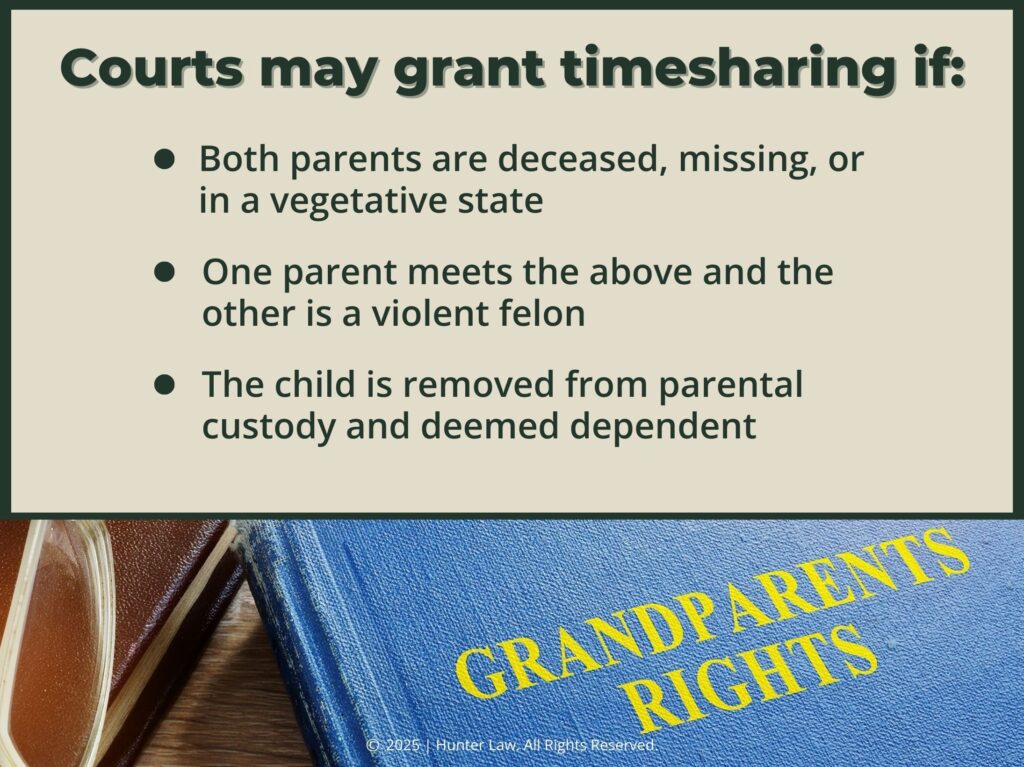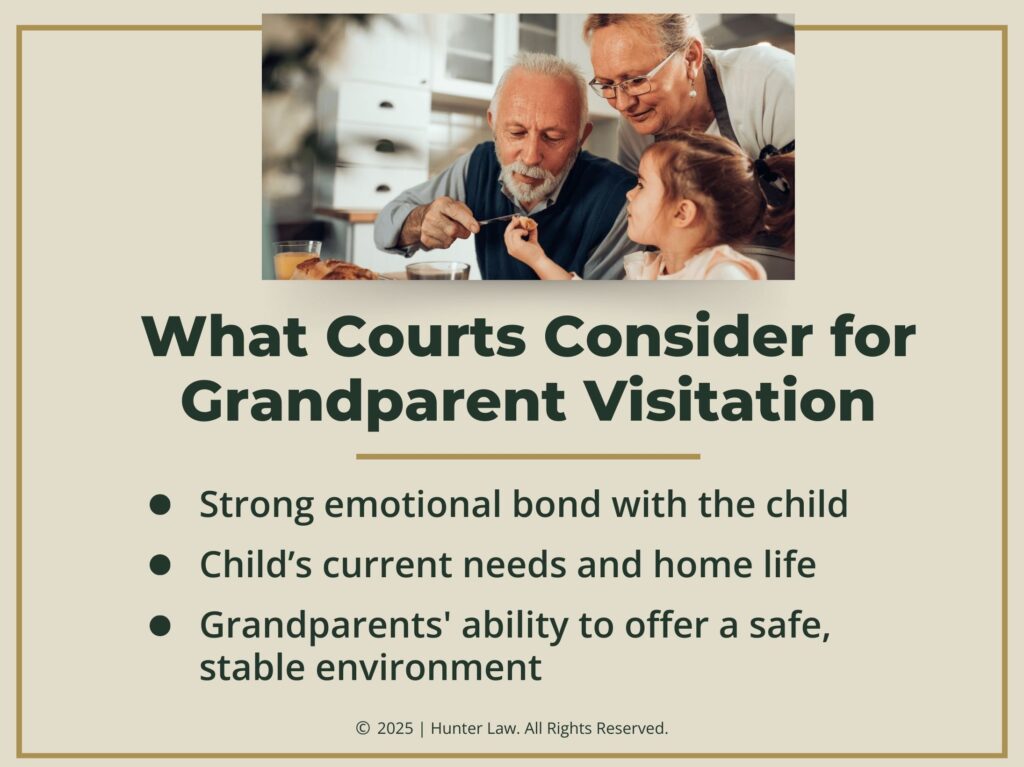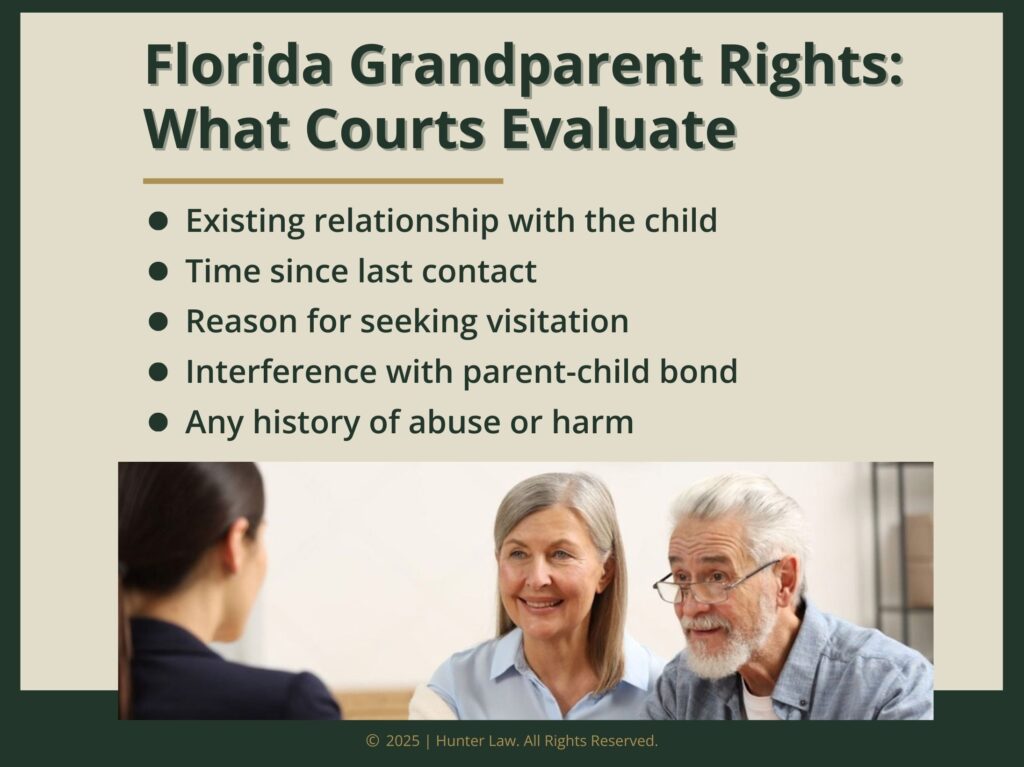Understanding grandparents’ rights in Florida is essential for families facing difficult legal or emotional challenges involving their children. In Tampa, grandparents do not have automatic visitation or parental responsibility rights, which can be confusing and stressful when trying to stay involved in a child’s life. However, Florida law does provide specific legal pathways for grandparents to pursue involvement when certain very specific and limited conditions are met.
These legal matters often arise during or after a divorce, following the death or incapacitation of a parent, or in situations where a child’s well-being may be at risk. Knowing your rights and the limits of those rights is critical for making informed decisions. Navigating this process requires both a clear understanding of Florida’s family law statutes and compassionate legal support.
At Hunter Law, we help grandparents in Tampa evaluate their legal options and take the necessary steps to protect their relationship with their grandchildren as provided by the law. Whether you’re seeking visitation (timesharing) or need to take a more involved role in a child’s care, we’re here to guide you with clarity and professionalism. Call (813) 287-2227 or contact us today for a free consultation.
What Are Grandparents’ Rights in Florida?
In Florida, grandparents’ rights are not automatically granted, even if they have played a major role in a child’s upbringing. State law strongly protects the rights of parents to raise their children without outside interference, meaning grandparents generally do not have legal standing to demand visitation (timesharing) or seek decision-making authority. While emotionally important, wanting to stay involved in a grandchild’s life does not, by itself, justify court involvement. The Florida courts clearly state that parental rights are fundamental and must only be limited in exceptional situations that pose a significant risk to the child’s well-being.
However, the law does recognize that in serious situations, a child may benefit from continued contact or care from a grandparent. Florida statutes allow grandparents to petition the court for visitation or parental responsibility if strict legal conditions are met. This may apply when the child’s parents are deceased, incapacitated, or found unfit due to issues like incarceration, abandonment, substance abuse, or violence.
Courts review these petitions carefully and require strong evidence showing that cutting off contact would harm the child. The process is complex, and working with a knowledgeable Tampa divorce lawyer can make a significant difference. Legal guidance ensures that petitions are filed properly, arguments are supported with documentation, and the grandparent’s role in the child’s life is clearly presented to the court.

When Can Grandparents Seek Timesharing/Visitation Rights?
Florida grandparent visitation (timesharing) rights may be considered by the court if:
- Both parents are deceased, missing, or in a vegetative state
- One parent meets the above condition, and the other has been convicted of a violent felony
- The child has been removed from the parents’ custody and declared a dependent
These conditions are outlined in Florida Statute §752.011, which governs grandparent visitation petitions in the state. In any of these scenarios, the grandparent must also prove that visitation (timesharing) is in the best interests of the child. The court does not take these cases lightly. Evidence must show that denying contact would cause harm to the child’s well-being. The burden of proof rests entirely on the grandparent, who must present clear and convincing evidence that supports their petition. This evidence could include testimony from teachers, doctors, or mental health professionals, as well as records (if admissible) that show a history of positive involvement with the child.
At Hunter Law, our team works closely with Tampa families to build strong, well-supported petitions that align with the child’s best interests. Visit our Family Law Services page to learn more about how we approach family law matters.
Can Grandparents Be Granted Parental Responsibility?
While Florida does not use the term “custody” in its statutes, grandparents may seek parental responsibility and/or timesharing if the parents are unable or unfit to care for the child. This may occur in cases involving neglect, incarceration, abandonment, or substance abuse.
To pursue this, the grandparent must file a petition showing why the child would be better off under their care. Courts look at several factors, such as:
- The emotional bond between the grandparent and the child
- The child’s current living situation and needs
- The grandparents’ ability to provide a safe, stable home

What Courts Consider in These Cases
When evaluating petitions for grandparents’ rights, Florida courts examine:
- The existing relationship between the child and the grandparent
- The length of time since the last contact
- The grandparents’ motivation for seeking rights
- Whether the grandparent has interfered with the parent-child relationship
- Any history of abuse or harm
These factors are weighed alongside the core standard in Florida family law: the Best Interests of the Child Standard. The court may also consider the child’s wishes, depending on the child’s age, maturity, and ability to express those wishes, as well as input from mental health professionals, educators, or other witnesses and third-party experts. Consistency, stability, and emotional well-being are all important in determining whether grandparent involvement should be granted.
At Hunter Law, we help families in Tampa present strong, well-supported cases that align with these legal standards. Our team understands how to structure arguments and evidence to meet court expectations and protect the child’s well-being. Learn more about our legal guidance for parenting-related cases by visiting our Timesharing and Parenting Plans page.
Filing for Grandparents’ Rights in Tampa
To begin the legal process, a grandparent must file a petition in the county where the child resides. The petition must include:
- The child’s and parents’ names
- A description of the requested visitation (timesharing) or parental responsibility
- Supporting evidence, such as documentation of the relationship, health concerns, or educational involvement
Many cases are referred to mediation before a court hearing. This allows the parties to negotiate without going to trial. If mediation fails, the court will decide based on the evidence provided.
Working with a lawyer for divorce or family law is essential in these matters. A Tampa divorce lawyer can help navigate local court procedures, file paperwork correctly, and advocate effectively on your behalf.

Peaceful Alternatives to Grandparents’ Rights Disputes
Not all cases need to go through court. When possible, informal agreements between parents and grandparents can preserve family relationships while avoiding the emotional and financial costs of litigation. These out-of-court solutions also tend to be less stressful for the children involved and allow families to maintain a sense of cooperation and trust. Some families use:
- Mediation to reach agreements outside of court
- Written visitation (timesharing) and parenting plans are included in parenting agreements
- Family counseling to resolve conflict and promote cooperation
These alternatives can often meet everyone’s needs without escalating tensions. By focusing on communication and compromise, families can create workable arrangements that benefit both the child and extended family members, helping to avoid long-term legal battles or strained relationships.
Why Work with a Tampa Divorce Lawyer
Hunter Law understands the emotional challenges families face when dealing with visitation (timesharing) and parental responsibility issues. These matters often arise in already stressful times, such as during or after a divorce, or following a major life change like the loss or incapacitation of a parent. Our team helps clients in Tampa explore all legal options, guiding them through the complexities of Florida family law while keeping the child’s well-being at the center of every decision.
Whether modifying a time-sharing parenting plan in Florida, working through sensitive issues related to alimony, or addressing guardianship or parental responsibility petitions, we take a comprehensive and personalized approach. We know that every family is different, so our legal advice is always tailored to your unique situation. At Hunter Law, our goal is to offer reliable, ethical, and compassionate legal support you can count on.
Conclusion: Protecting Grandparent-Grandchild Relationships
Grandparents often play a valuable and often irreplaceable role in children’s lives, offering emotional support, stability, and generational guidance. However, under Florida law, grandparents’ legal rights are not assumed. Instead, they are granted only when very specific legal standards are met. This makes it essential for grandparents to understand what the law allows and how to approach it correctly.
If you’re a grandparent seeking visitation (timesharing) or parental responsibility in Tampa, taking the proper legal steps with the help of a trusted attorney can make all the difference. These situations can be emotional and complicated, but you don’t have to navigate them alone.
Contact Hunter Law today at (813) 287-2227 or fill out our consultation form. We’re here to help you take the next step with confidence, clarity, and care.


